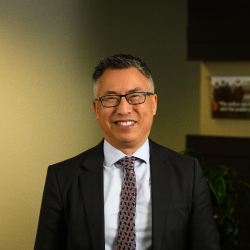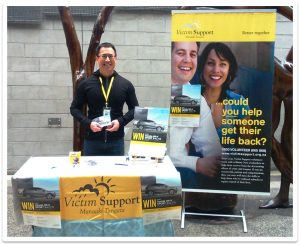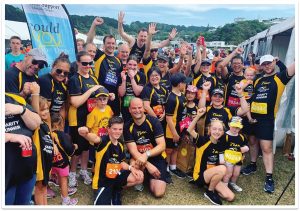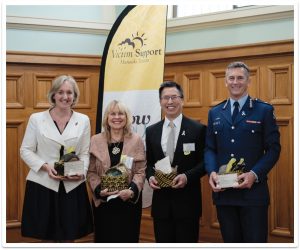Kevin Tso knows something about transformation and growth. In January 2022, he completed 12 years at Victim Support New Zealand, for 9 of these years he’s been the Chief Executive. Leaving has been Kevin’s choice; as he enters a semi-retirement phase he leaves Victim Support in good heart. On behalf of Victim Support New Zealand, he has recently completed a 10 year strategic plan, the Vision 2030 strategy, and a 3 year implementation plan called the ‘Roadmap’. The Roadmap also includes a cultural response plan, based on the organisation’s responsibilities to the Treaty of Waitangi, Te Whiringa.
It’s been quite a ride for Kevin over the years, managing support with limited funding in the face of growing demand. Over the past financial year, Victim Support New Zealand has helped over 42,000 victims, compared with 32,000 4 years ago.
Recent challenges have included the response to victims of the 2019 terrorist attacks, and the distribution of donations for the same victims – both of which were carried out successfully; the organisation continues to provide support to a number of the mosque attack victims. Additionally, in 2019, the eruption of the volcano at Whakaari/ White Island required a significant response from Victim Support New Zealand. And of course, over the past two years, the Covid-19 pandemic has been an added complexity as the organisation responds to victims’ needs.
In this edited conversation with Victim Support Europe, Kevin talks about how a leader’s actions must be tailored to meet the demands of a victim support community.
 Kevin, please tell us a little bit about yourself. How did you end up working for victims of crime? What drew you to this work?
Kevin, please tell us a little bit about yourself. How did you end up working for victims of crime? What drew you to this work?
I’m a proud New Zealander, born and brought up in the capital city, Wellington. As a member of family with Chinese heritage, I have always been conscious of living in a strong Anglo-Saxon culture. The desire for acceptance and inclusiveness has been a feature of my psyche, and hence I was drawn to an organisation which values inclusiveness and human rights.
For how long have you been with VS New Zealand? What has been achieved during these years?
I have been with Victim Support New Zealand for 12 years, almost 10 of these as Chief Executive. In any organisation I have been involved in, my objective has been to add value and leave it in a stronger and more sustainable position than when I started.
Victim Support’s quality of work is much celebrated, along with raising awareness and the value of its work to the community. In the most recent annual consumer survey, 94% of respondents (having received assistance) said that Victim Support was either helpful or very helpful. With regard to sustainability, during my tenure, two strategic plans have been developed and implemented or are in the process of being implemented. These are Vision 2020 (a five-year plan) and Vision 2030 (a ten-year plan), they have been developed to include the voice of the workforce, the major stakeholders (including government funders), and environmental factors. A common vision, together with internal and external stakeholders, is so important to both sustainability and the achievement of objectives.
What does VS New Zealand do?
Victim Support provides a free, nationwide 24/7 support service for people affected by crime, trauma, and suicide in New Zealand. We help our clients to find safety, healing, and justice after a crime and other traumatic events. We work closely with our operational partner, the New Zealand Police.
In the 2020-21 year, over 43,600 victims of crime and trauma were supported in a country of 5 million people.
How does VS New Zealand assist victims?
 Victims access the organisation through referrals and self-referrals, through the Police and other agencies. Our team of highly trained, volunteer and paid, support workers engage with the victims face to face, or virtually, to identify their needs and the context in which they find themselves – which is often fluid.
Victims access the organisation through referrals and self-referrals, through the Police and other agencies. Our team of highly trained, volunteer and paid, support workers engage with the victims face to face, or virtually, to identify their needs and the context in which they find themselves – which is often fluid.
Our role is to empower our clients to make decisions to meet those needs. Self-determination is the goal, often with referring-on to other agencies, identifying key family members, and counselling, depending on the stage of the victim’s journey. Whilst independence is the goal, we will stay with the client for as long as required.
For example, in 2019 we supported over 1200 people who were victims of the terrorist attacks in Christchurch. Today we continue to support these victims, but the numbers are now in the double digits.
Quotes from those we supported:
Wayne: The most important thing is when they said they were going to ring, they rang. When they said ‘if you need us we’re available’, they were. And to have that credibility and trust at a time when the world is falling to pieces was just amazing.
Carol: The excellent advice, the empathy, and the strong follow-up. And she had just such a gentle nature about her.
Bond: Having someone that’s unconditionally on your side.
Mele: Just their ongoing willingness to be there and not to give up. Because you can’t give up. But one or two phone calls isn’t going to do justice; you have to have ongoing support because that is a link to that lifeline the person requires.
Carol: Just the follow-up was impressive. Absolutely impressive. And I think what really helped me the most in this current situation was there was follow-up, even when I said that I was fine, they still made one or two more phone calls just to make sure that I was okay.
Aunty: She has talked to me, she has met with me, she’s discussed what I’m going through, she’s offered to come to appointments with the lawyer, she’s offered to provide a food parcel which was really crucial for me at the time…
Wayne: Rather than telling me what to do, they empowered me to make my own choices and take responsibility for those choices, which was good at a time when I was pretty indecisive and didn’t know which way was up or down. That was excellent because then I feel like the whole thing has been my decision all the way through.
Mele: It gives me the courage to be able to continue, knowing that I’ve got that support behind me regardless.
What is the nature of victimhood that VS New Zealand deals with?
Victimhood is a broad term. Victim Support New Zealand is predominantly operational, with a primary focus on receiving referrals, mainly from the Police as mentioned above. We deal with many incident types from burglary to homicide, and also trauma from Police-reported sudden death and suicide. Much of Victim Support’s work is in family violence. We have a particular strength in supporting ‘low-risk’ family harm victims with the aim of preventing escalation into more serious harm. We support both female and male victims of family harm, non-binary, and intra-familial violence victims.
The length and volume of engagement is increasing as we are taking an outcome approach. This means attending to the underlying issues and supporting the client to make decisions that have a longer-term benefit in their life’s journey. This is a matter of choice for the victim, but previously Victim Support primarily focused on the crisis itself.
Support also includes encounters with the criminal justice system, which is becoming more complex and, in the context of COVID, is taking longer. Court participation may be a combination of both virtual and in-person appearances at the various hearings.
We also promote advocacy. This is also a broad term, but Victim Support New Zealand advocates for victim-centric changes to legislation, policy, or systems that will be inclusive of, and benefit victims. We regularly present evidence-based submissions to government and policy-makers, based on our experience of working with victims, the voices of victims themselves, and published research — including our own research. For example, in the case of strengthening New Zealand gun laws – the government-appointed Select Committee, which listens to interested parties, took into account Victim Support’s submission after we presented our statistics on firearm-related incidents, and research showing how family violence can turn deadly when firearms are accessible.
We also recently submitted advice to Parliament on the Rights for Victims of Insane Offenders Bill, to give victims of forensic patients’ rights comparable to victims of other offenders dealt with in the criminal justice system. We successfully advocated for an amendment to this Bill, giving these victims the right to make a victim impact statement.
Have you seen any change in society’s attitude towards supporting victims of crime during your time working at VS New Zealand?
The public have always been encouraging of Victim Support’s work. However, until people experience this support themselves, that’s when they often fully appreciate and understand what it means. The quotes above exemplify that. What we do is not easily publicised to demonstrate the benefits.
In this connected world, more and more people are conscious of human rights, and seeking accountability, so I believe this is the reason why demand for our services is rising. A Crime and Victim survey, which is regularly conducted by the New Zealand government, has consistently demonstrated that only 25% of crime is reported. We as a country need to facilitate reporting crime so it becomes a more viable option for the public.
You leave Victim Support in good heart, having recently completed a 10-year strategic plan, Vision 2030, and a three-year implementation plan called the Roadmap. Could you please elaborate on this?
 As mentioned, the strength and success of any entity lies in a unified purpose and clear plan. In our case, participation of our own people and stakeholders in these plans was comprehensive. A strategic plan is often very high level, while the implementation plan identifies the actual components needed to achieve the strategic objectives in a real and pragmatic way. Foci in the Roadmap are, for example, developing more positive steps in being culturally responsive; attending to the wellbeing of our workforce; ensuring our best practice is world class and evidence based; improving our systems and ICT to provide access for victims, but also to make it easier to operate for our own workforce, which facilitates their focus on the client.
As mentioned, the strength and success of any entity lies in a unified purpose and clear plan. In our case, participation of our own people and stakeholders in these plans was comprehensive. A strategic plan is often very high level, while the implementation plan identifies the actual components needed to achieve the strategic objectives in a real and pragmatic way. Foci in the Roadmap are, for example, developing more positive steps in being culturally responsive; attending to the wellbeing of our workforce; ensuring our best practice is world class and evidence based; improving our systems and ICT to provide access for victims, but also to make it easier to operate for our own workforce, which facilitates their focus on the client.
We are also looking at how we can provide services for victims independent of what happens in their “process journey” through the criminal justice system – or whether they even report crime in the first place. Supporting people outside of the criminal justice system is essential, given that most don’t find healing within it, and that only 25% of New Zealanders report crime.
As the focus our 22 February campaign is on the issue of ‘Safe Justice for Victims’, could you please tell us what works well in the justice system in NZ and what are the challenges victims face in criminal proceedings?
The fundamental issue in New Zealand is that we have an adversarial justice system (Westminster base) which has a focus on the offender and the Crown. Our own recent research, which echoes findings in New Zealand and overseas, showed that 68% of victims felt justice had not been served in their case, despite the majority of these cases resulting in a guilty verdict and imprisonment. We found victims face barriers of fear, exclusion and unfairness – and underpinning this was a sense among victims that the justice system did not genuinely care about them. These barriers may be even more pronounced for Māori and other minority groups.
Hence, our focus is on improving procedural justice and we have seen this recently with new legislation to prevent the revictimisation of sexual violence victims. Among other things, these victims may now give evidence via video recording instead of appearing in court, and lawyers are prohibited from unfair or “victim blaming” questioning.
Another area that’s working well is restorative justice and youth justice family group conferences (FGCs). New Zealand was the first country to introduce FGCs for youth offenders in the 1980s, to try to keep young people out of the criminal justice system. Victim Support is currently piloting a trial of victim navigators to improve victims’ participation and outcomes in FGCs. We routinely support victims through restorative justice processes in the adult court too. But there is room for more innovation, including restorative options for victims who do not want to go through the courts.
We do have a Victim Rights Act, but that is not well enacted and fundamentally does not provide substantive status for the victim to participate in the criminal justice system. There is a Chief Victim Advisor to government, but this role is not full time, and progress is too slow for this role to make gains, but at least the voice is there.
Successive New Zealand governments have also been very slow in responding to victims’ rights in a pragmatic way, although there is much lip service on the will to provide victims with the status that they should have. Therefore, much is yet to be achieved.
Victim Support’s operational focus is under strain due to increasing demand, increasing duration of engagement with victims and rising costs, so resource and funding is always an issue, especially as we professionalise. We have applied for funding from this year’s government budget.
While the organisation relies on volunteers for its response to clients, retaining highly skilled, suitable volunteers is an increasing challenge. At this point, our paid workforce has increased to around 180 out of 600 staff/volunteers. We are relying on a higher proportion of paid workers, but this is constrained by funding, which is disproportionately low compared with funding for offenders.
Learn more about the work of Victim Support New Zealand:
– Vision 2030, a 10-year strategic plan
– Roadmap, a three-year implementation plan, in graphic and text
– Victims’ Voices: The Justice Needs and Experiences of New Zealand Serious Crime Victims. Research report by Petrina Hargrave, PhD

